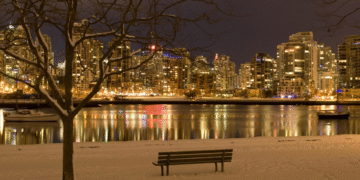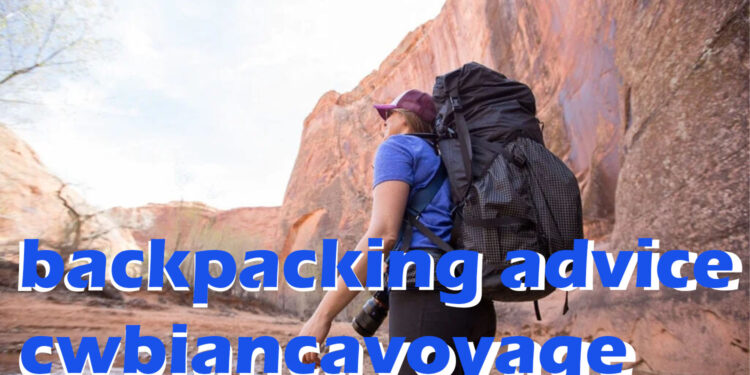Backpacking is one of the best ways to explore the world. It gives freedom, new experiences, and a chance to live close to nature. But backpacking is also a challenge. You need to carry your home on your back, plan your trip carefully, and make smart choices.
The travel writer CWBiancaVoyage has shared many useful tips for new and experienced backpackers. Her advice focuses on traveling light, being safe, and staying open to adventure. In this article, we will look at her main backpacking advice and connect it with other reliable tips from outdoor experts.
Why backpacking advice matters

When you are on the road or in the mountains, you cannot always buy what you need. Every mistake can make your trip harder or even dangerous. Good advice helps you avoid problems, save money, and enjoy the journey more.
CWBiancaVoyage reminds us that backpacking is not only about packing things, it is about the right mindset. A smart backpacker is prepared but also flexible. Plans may change, weather can surprise you, and sometimes the best part of the trip is what you did not plan.
Research your destination
Before you start a trip, do good research about your destination. Learn about:
- Weather conditions in the season you plan to go
- Local culture and customs
- Permits or entry rules for trails and parks
- Safety concerns, like wild animals or political issues
CWBiancaVoyage always explains that research saves you from stress later. For example, if you plan a hike in the Alps in May, you must know that snow may still be on the trails. If you go to Southeast Asia, you should learn about monsoon rains and how they affect transport.
Reliable sources for research include guidebooks, travel forums, local tourism websites, and official park sites.
Pack light, pack smart
One of the strongest pieces of advice from CWBiancaVoyage is to travel light. Carrying too much weight will make you tired and reduce your joy. The rule is simple: if you don’t really need it, don’t take it.
Tips for smart packing:
- Choose versatile clothes you can wear in different situations
- Take layers instead of heavy jackets, so you can adapt to changes in weather
- Limit shoes to two pairs: one for walking or hiking and one light pair for rest
- Use packing cubes or compression bags to keep things organized
- Keep important things easy to reach: water, maps, first aid kit
Experts also suggest that your “big three” items (backpack, sleeping bag, and tent) should be high quality and as light as possible.
Invest in good gear
Gear can be expensive, but buying cheap equipment often costs more in the long run. A broken backpack zipper or leaking tent can ruin your trip. CWBiancaVoyage always says: “Buy gear you can trust with your life.”
Essential gear:
- Backpack that fits your body well
- Tent or shelter suited for the weather
- Sleeping bag for the right temperature
- Reliable shoes or boots tested before the trip
- Water filter or purification tablets
- Headlamp or torch with extra batteries
Good gear also means safety. For example, a strong water filter protects you from sickness. A good tent protects you from storms.
Keep plans flexible
Many new backpackers try to plan every day and every step. But real travel is not always like the plan. Buses are late, the weather changes, or you meet new friends who invite you to another place.
CWBiancaVoyage suggests keeping your plans loose. Have an idea of your route and main goals, but allow space for surprises. This makes the trip less stressful and more fun. Sometimes the best memories come from unplanned moments.
Learn basic navigation
Phones and GPS are useful, but batteries die and signals get lost. That is why every backpacker should learn simple navigation. Carry a paper map and a compass and practice using them.
Even in cities, maps help you when your phone fails. CWBiancaVoyage also reminds travelers to download offline maps before leaving Wi-Fi zones.
Respect local culture and environment
A big part of backpacking is meeting new people and seeing new cultures. Respect for local traditions makes your trip more enjoyable and safe. Dress modestly in conservative areas, learn a few local words, and follow rules in religious places.
At the same time, protect the environment. Follow the “leave no trace” principle:
- Take your trash with you
- Do not disturb animals
- Stay on marked trails
- Save water and energy
Stay safe and healthy
Safety is always important. Backpacking often means being far from hospitals or police. You must think about your health and protection.
Safety and health tips:
- Carry a small first aid kit with bandages, painkillers, and medicine for stomach problems
- Drink enough water and avoid dehydration
- Protect yourself from sun with hat and sunscreen
- Store emergency contacts and a copy of your passport
- Buy travel insurance for long trips
- Inform someone about your route if you go hiking alone
CWBiancaVoyage also says to trust your feelings. If a place or person makes you uncomfortable, it is better to leave.
Budget wisely
Backpacking is often done on a budget. Planning money well lets you travel longer and with less worry.
Tips include:
- Track your daily spending
- Use public transport instead of taxis
- Cook your own meals when possible
- Keep some emergency money hidden in a safe place
- Choose hostels, guesthouses, or camping instead of hotels
Train your body before the trip
Walking with a backpack for hours is not easy. Before your trip, do some training. Hike with weight on your back, practice climbing stairs, and improve your stamina. This way, your body will be ready and you will enjoy the journey more.
Mindset: enjoy the journey

Backpacking is not only about reaching a destination. It is about the journey itself. A positive and open mindset is one of the main tips from CWBiancaVoyage. You may face problems, but if you see them as part of the adventure, you will always come back with good stories.
Final Thoughts
Backpacking advice from CWBiancaVoyage is clear: travel light, stay safe, and be flexible. With the right preparation, good gear, and an open mind, backpacking becomes one of the most rewarding ways to travel. Every trip will teach you something new, but following this advice gives you a strong start.
Frequently Asked Questions (FAQs)
1. How heavy should my backpack be?
Experts suggest no more than 20% of your body weight. Lighter is better.
2. Do I need expensive gear to start backpacking?
Not always. Start with basic, safe gear and upgrade later. Some items, like shoes and backpacks, are worth better quality.
3. How do I choose the right backpack size?
Choose one that fits your body length and can carry your gear comfortably. Most people use 40–60 liters for multi-day trips.
4. Is it safe to backpack alone?
Yes, but you must take more care. Inform others about your route and stay alert. Solo backpacking can be rewarding but needs preparation.
5. How can I find cheap places to sleep?
Look for hostels, guesthouses, or camping areas. Apps and websites for budget travelers can help.
6. What food should I pack for hiking trips?
Light and high-energy food like nuts, dried fruit, pasta, rice, and instant oats. Fresh food if available on the way.
7. What if it rains during my trip?
Pack a rain cover for your backpack, a light rain jacket, and waterproof bags for electronics.
8. How do I stay safe from animals in the wild?
Keep food in sealed bags, do not approach wildlife, and follow local rules for bears or other animals.
9. Do I need a map if I have a phone?
Yes. Phones can fail. Always carry a paper map and know how to use it.
10. What is the best way to meet other travelers?
Stay in hostels, join group tours for a day, or talk to people on trails. Backpacking is social, and many people are open to new friends.
Relatable topic: Methatreams, Coyyn.com Business, Techsslaash com, Pabington














































